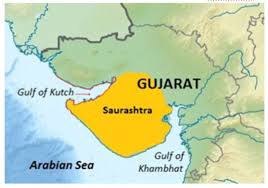Gulf of Kutch:

According to a recent report, the long-term survival of dugongs in the Gulf of Kutch and the Andaman and Nicobar Islands is highly uncertain or challenging.
- Gulf of Kutch is an inlet of the Arabian Sea.
- It is located along the west coast of India, in the Jamnagar district of Gujarat.
- It divides Kutch and the Kathiawar peninsula regions of Gujarat.
- It stretches for 99 miles and is famous for the coral reefs surrounding the 32 islands.
- A unique feature of this region is the tidal range, which generates fast currents of about 2.5 m per second.
- It is a region with the highest potential of tidal energy generation.
- It is rimmed with mudflats, and many small islands rise from its waters.
- The Gulf of Kutch, occupying an area of 7300 sq.km. is biologically one of the most productive and diversified habitats along the west coast of India.
- The southern shore has numerous islands and inlets which harbor vast areas of mangroves and coral reefs with living corals.
- The northern shore with numerous shoals and creeks also sustains large stretches of mangroves.
- The western extremity of the Gulf consists of a vast complex of marshland criss-crossed by innumerous creeks.
- Marine National Park is situated on the southern shore of the Gulf of Kutch. It is the 1st National Marine Park of India.
- Dugongs are the only herbivorous mammals found in India’s marine ecosystems.
- It is known as the sea cow but resembles a cross between a seal and a whale, and is distributed through the Indo-Pacific region.




